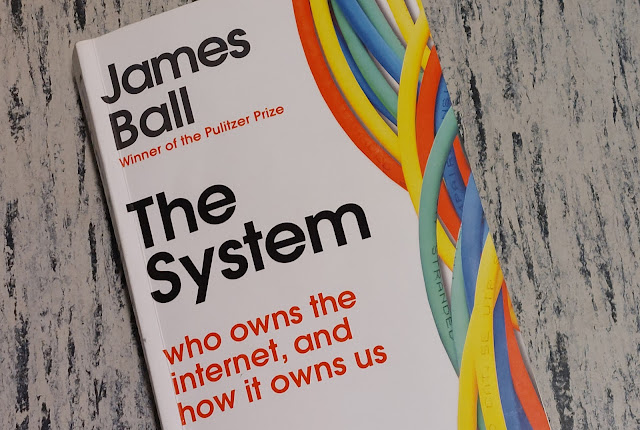I read the 2020 book The System. Who owns the internet, and how it owns us from James Ball.
Instead of explaining the technical workings of the internet deeply, or dwelling too much on the invention of computer networks, Ball instead presents a loosely chronological cross-section of the forces that, in different times, molded the internet as we know it.
The focus is in the who owns the internet, and how it owns us part, identifying challenges in various areas regarding loss of privacy, concentration of wealth, aggressive advertising, eradication of journalistic quality, threats to net neutrality...
I'm making shortcuts by not addressing the origins of these varying opinions, and for most part simply go with "Ball says", the author being responsible for the book as the curator and presenter of these viewpoints.
The story so far
Ball figures the early era (about 30 years) was when most of the decisive technologies and protocols were set, but were in no way envisioned for a multi-billion user, global internet. The stage is set for an environment that is used by large masses of people, having implications for ethics and security both in national and global scale.
With the invention of the World Wide Web the commercialization of internet began in earnest, leading towards the original dotcom boom and crash. Venture capitalist funding has served as the driving force of the internet for the past 20 years. Seeking to make ever larger profits through new companies, the bigger companies then foster a new generation of influential startups. The new smaller companies will be hungry to demonstrate their viability for the next round of funding.
Pretty much the only thing that can be monetized is a large user base and increasing it, this is what they will try to gather, at first providing benefits "for free" to the users. This has had also social and political consequences that took the company founders by surprise. Whereas there are good grounds for claiming the internet network itself is a neutral utility, sometimes the providers of the "platform internet", such as Facebook, have argued similarly when their service has helped sway public opinion for the worse.
The internet never was the same as WWW, but arguably it's the surface layer of things that make it a force for people. But even the "WWW era" may eventually be a thing in the past, as smartphone app ecosystems have proven. Regulatory approaches lag behind, and may not even always touch what is happening in the ever-changing app world. Movements are born in channels like Facebook, Youtube, Twitter, Twitch and so on. The mobile phones are loaded with apps and services that utilize the internet connection in different ways. In some countries, the ISPs don't sell so much "internet" but "facebook".
The book sheds light into the complex way ads developed over the internet, from modest contextual banner-ads to the programmatic, then the targeted/auctioned ads of today that have helped generate an ecosystem of fake content and clickbait headlines. Some sites have begun to live an independent life from any "quality" website. Ball accuses publishers having almost willingly given away their position as a provider of lucrative ad space, whereas initiatives like the GPDR only succeed to miss the original point (of curbing the rampant ad-cookie exploitation).
Ball questions the truism that ads are needed for any free content, as internet did nicely before targeted ads. He suspects that middlemen benefit far more than the deserve, but also suggests that things wouldn't need to be as bad as it is. Ads can actually serve a purpose, but something about the system needs to be better tuned to avoid the worse excesses.
The recurring triad of evil here is Silicon Valley-style Big Tech (make things fast and fix them later), Free-market economic theory derived from Reagan/Thatcher era (what makes wealth is also morally validated) glued together with Venture Capitalism. (fund a promise of future profit despite current viability)
A new global war
The story shifts to cyber attacks, security, surveillance and the Snowden revelations on NSA, a story which Ball had a direct involvement with. Just to recap, NSA experimented with a system that would store "everything" in UK communications for three days, and the metadata for 30 days, something that was technically kind of legal there. Furthermore, NSA had actively sought deals with companies and online service providers to build backdoors in them. From some kind of niche occurrence, hacking has turned into a constant cyber war being waged between governments.
All this wasn't achieved by intelligence agencies alone, nor was it devised by governments as some kind of intentional conspiracy. Ball argues that the aforementioned advertisement capitalism led to a situation where massive pools of user data were suddenly available on the internet, given away willingly (or at least without worry) and eventually worth experimenting with.
Platforms such as Facebook are here seen as an extension of US "soft power" abroad, hence the US might not have been that eager to regulate tech companies and their platforms in the first place. The apparently altruistic push to bring internet to less developed countries can be seen as building US beach-heads for favoring their established companies. So, it's not simply a language barrier and a dictatorial regime that makes countries like China and Russia build their own version of the platform-internet.
It's also an issue who will host the new version of the internet's surface layer in the future and what it will be like. The danger of 5G is not some skull-eating radiation, but that with the new standards there's an opportunity to smuggle in ideas about network "slicing" that again may undermine net neutrality, become a new kind of surveillance tool, or another "soft power" extension of some nation, this time perhaps China. When Huawei was stopped, it was largely on suspicions for the kinds of things US had already previously practiced when holding the strings of the internet.
A couple of times the book draws parallels between internet and the original railroad expansion, acknowledging the main difference that railways tended to centralize and internet is inherently dispersed. But what is being centralized is the wealth in the hands of those who were already well-to-do before internet existed, much like what happened with the railroad.
Whereas industry giants could benefit and leverage the railroad network to gain advantages in other fields, the 20th century anti-trust activities largely put this to an end. Mergers are still scrutinized, yet when something similar happens on the internet, it's not an issue, as Ball repeatedly points out. The Facebook acquisition of WhatsApp is especially lambasted here, but companies like Google(Alphabet) and Amazon likewise made strings of acquisitions without being questioned.
Uh, huh
So, all in all a very light read, but not altogether "light" in the themes it presents. The angle is journalistic rather than academic, giving it more dramatic tension throughout, perhaps even an agenda. The quotes from the interviewed people speak a story, and the reader can make their mind about them.
Still, the discussions and opinions are from noted authorities (including academics) so their voice does have weight. There is a value of having a book like this on your lap while things are still happening, rather than having the academic account ten years later.
I'm not sure what to make of all the pessimism. On one hand the book is attempting to shake people out of the kind of "Yeah it's bad but what are you gonna do" mentality, on the other hand it does paint a picture of a very major complex that can barely be touched by individuals.
The suggested remedies in the book are intentionally somewhat anti-climactic. The whole message of the book is that the internet has a number of different problems in it, and therefore there is no one major fix. Advances can and should be made in multiple smaller areas. At best it is possible to encourage a "systemic" view into the complexity that is the internet and to remind it's the people that set it up and formed it in the first place, not some force forever outside our reach.



